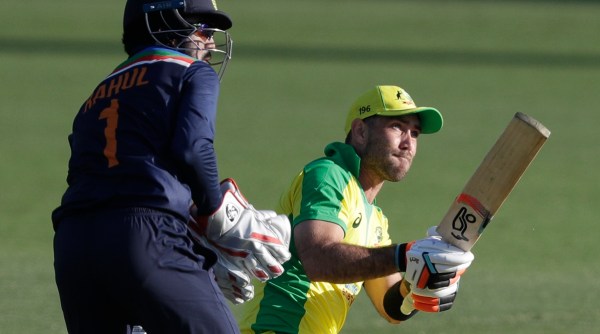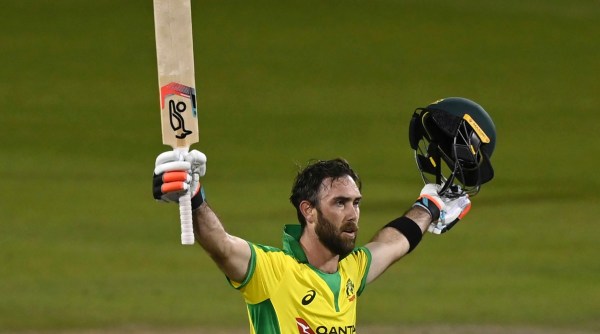 Glenn Maxwell scored 108 runs in IPL from 13 matches. In the two ODIs against India, he has accumulated as many runs at a strike rate of 225 and hit seven sixes (Source: AP)
Glenn Maxwell scored 108 runs in IPL from 13 matches. In the two ODIs against India, he has accumulated as many runs at a strike rate of 225 and hit seven sixes (Source: AP)Glenn Maxwell had just broken down. His first real emotion, he believed, in five months. He had confided about his depression and decision to take a break to his team-mates last November. They had just left the dressing room after hugs when he teared up. Until then, he was on the run, afraid of stopping and looking within until it became unbearable.
Five months before that, he was feeling claustrophobic at nets during the World Cup in England. He had been dismissed a couple of times to bouncers and his mates were gunning for his head in the nets. He saw the coach whispering something to a bowler. “What was he telling? … then all of a sudden, I’m getting balls past my ears when we’ve got no sight screen. Wickets are terrible, like you’re in this enclosure where you can’t get out … the frustration starts to build and then your performances start to get worse.”
In one training session, Maxwell was nailed on the left arm by Mitchell Starc. “I was pretty angry. I was frustrated. I was upset.”
Maxwell was rushed to the hospital with Shaun Marsh, who too was hit by a bouncer in the nets. Marsh was hoping against hope that it wasn’t a fracture. Maxwell was hoping his bone was broken. “It doesn’t feel like it’s snapped right through. I was thinking about things I could do on the way back to snap it … I was so angry with myself. I had indirect anger at other people on it. It didn’t make sense … I was frustrated with the way (I was) playing, I was frustrated with how I was being perceived… this (injury) was my ticket out of disappointment.”
He wasn’t dropped, and got a phone call that he will be playing in the semifinal against England. With him in the room was Vini Raman, his fiancée (and the one who first spotted that he was perhaps suffering from depression), he broke down “bawling” after the call. Australia were drubbed, he doesn’t score many and was fretting in the dressing room at the end of the game. “I felt like I was 100 per cent to blame and I was looking around the room going ‘I wonder if they’re thinking the same thing’. I wonder if they’re looking at me going ‘If only Max, you had turned up this tournament.’”
Frank, passionate with the occasional pangs of pain detectable in his voice, Maxwell opens up on his mental demons with Neroli Meadows in her podcast Ordineroli Speaking. There is much to process and certain events stand out.
Like the day after he returned from the hospital in England and was thrown into another intense net session. “I was on a few painkillers and I had JL (Justin Langer, the coach) and Ricky Ponting (batting consultant) just bounce the crap out of me in one net to see if I was ready to go. And that was my fitness test and got hit a couple of times, but I just sort of literally, blank-faced and just went, ‘yep, yep, this is what I’m doing here. Sure. Whatever makes everyone else happy. I’ll just, I’ll just do it. I’ll just get through the rest of this tournament.’”
Last November, in the middle of a T20 series, Maxwell decided to take a break after speaking to team psychologist Michael Lloyd and Langer. It was then that he told his team-mates. Lloyd put him on to sports psychiatrist Dr Ranjit Menon, an external consultant for Cricket Australia.
 Australia’s Glenn Maxwell, right, hits a six during the one day international cricket match between India and Australia at the Sydney Cricket Ground. (AP)
Australia’s Glenn Maxwell, right, hits a six during the one day international cricket match between India and Australia at the Sydney Cricket Ground. (AP)
The pressure of living up to potential can make athletes’ lives feel like a perpetual missed opportunity and trigger an abiding sense of loss. Even when he was fielding, he says, “I would be off with the fairies”.
He met Menon in November, after a week of shutting out the world. “I would sit on the couch and watch TV.” The phone would buzz, he wouldn’t always engage. Dr Menon refused to speak on specifics of Maxwell’s case but shone a light on the broader theme.
“Athletes acutely feel the sense of being judged negatively and over time, that can be a debilitating feeling. Broadly, I would say that athletes develop a certain sense of identity based on performances. At a very young age, they are reared as professional athletes. The way their underlying personality develops over time is heavily influenced by athletic performances – we call it athletic identity,” Menon tells this newspaper.
“Part of that identify is wanting to perform to that level consistently. And your internal expectations of your own self get significantly affected. For some, it can have disastrous consequences like becoming depressed and acutely anxious. Then the external expectations, like coaches and fans needing you to perform, and when you are not performing at the level they expect you to, you feel like you are letting them down,” Menon says. “Some athletes might have pre-existing vulnerability, be it genetics or whatever. They have had this issue for long time and when they come to a high-performance environment, it manifests itself. The second set of people are those who haven’t had this issue before but because of that environment and pressure, they start to developing a new onset of illness.”
 Australia’s Glenn Maxwell opens up on his mental demons (Source: AP)
Australia’s Glenn Maxwell opens up on his mental demons (Source: AP)
Simon Helmot, a coach in the Big Bash and IPL, remembers a moment in a dugout in 2011 after Maxwell had almost singlehandedly won a game for Victoria Bushrangers against Tasmania Tigers in the One-day Cup. Coming in at 157/6 with less than 10 overs left, Maxwell smashed Australia’s fastest domestic half-century (27-ball 61, the fifty came off 19) to help chase down 269. His previous highest for the team was 33.
“When I congratulated him all excited, he goes, ‘You look surprised, coach. That’s what I do!’ and everyone laughed. It was the breakout match for us, and for him,” Helmot tells this newspaper. “At u-19 level, he had the ability to strike the ball at far greater power than others. When he came to Victoria Bushrangers, he could hit the ball to different places and set himself differently from most at the crease.”
Maxwell has continued to set himself differently; the most recent mutation since he returned from his mental health break has been his wide-open stance. The front shoulder points towards midwicket and curiously, the bat faces the bowler, and at times even mid-off. The open stance was presumably to counter the short-ball and also provide greater access to areas he wanted to target. In IPL, it seemed the stance sucked the power out of his shots as he either kept dragging everything to the onside or the bowlers hurled it well outside off, making him reach out ineffectively.
Not a single six came and Maxwell eked out 108 runs from 13 IPL games and took three wickets. Tom Moody, international and IPL coach, felt it could be down to the pressure of the money. “Clearly, he is having trouble coming to terms with playing with the pressure of the price tag (in IPL),” he told ESPNCricinfo in October. “May be, he is overwhelmed.” Since getting back with the Australian team, Maxwell has reeled off two valuable contributions with the bat, powering them to totals beyond India’s reach with his scintillating shots.
Helmot, who spoke before the first ODI in Australia, was sure that runs would come for Maxwell. “He is a problem-solver. About the lack of runs – is it the technique or wrong shot selection? He will use the switch hit more in this series, the reverse-paddle, I feel, as he wasn’t using the offside that much in the IPL. The new technique and strategy haven’t matched yet; it will I feel in this series.” Helmot has been proved right.
When Maxwell’s inconsistency was criticised in the past, his fans would say, ‘don’t nag him about what he can do more; appreciate what he does’. When the external expectations fall, perhaps the internal expectations would be re-altered and Maxwell version 2.0 might well be his most unshackled, free, avatar ever. In many ways, Maxwell has a boy’s view of what it is to be a batsman. The predetermination in most shots, the child’s confidence that he can pull off reverse-laps and such, the urge to whisk the ball to unconventional areas – he bats like someone raised on gaming platforms, and is perhaps the true representative of this generation.